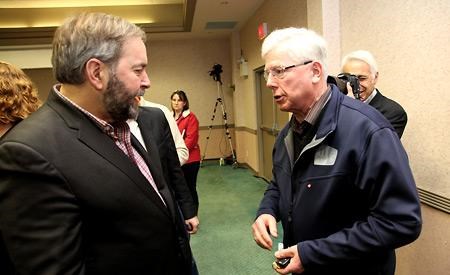Canada’s New Democratic Party (NDP) is in a position to form federal government unlike any other time in its history, according to its leader.
Thomas Mulcair, also leader of the opposition in the House of Commons, speaking to a standing room only audience at Powell River Town Centre Hotel, Monday, March 2, said the NDP is in a three-way race to win the federal election in October.
Mulcair, a former minister of the environment in Quebec’s provincial government, came to disagreement with his party and was courted by Jack Layton, the federal NDP leader of the day. Mulcair was convinced to run in a Quebec by-election in 2007 and won.
Layton told Mulcair that in the 2008 general election he was going to do something no NDP leader had ever done before.
“Jack said he was going to look to the Canadian people and say he was running for prime minister,” Mulcair said.
Mulcair said Layton indicated there would be a lot of disbelief from journalists and even a number of party members.
“Then he said something really important,” Mulcair said. “He said he actually knew there was no way the NDP would form government until we can become the official opposition. Jack Layton had a very clear roadmap.”
The NDP had never won a single seat in Quebec during a general election but after five years of nonstop work across the province, the tide turned. In the 2011 general election, the NDP had “a massive breakthrough,” became the official opposition, and “anyone who said they saw it coming ain’t telling you the truth.”
Mulcair said he won his office pool, having predicted 34 seats for the NDP in Quebec. The tally was actually 59.
Residents of Quebec are receiving a message from the NDP that they have never heard from another political party—a consistent, progressive, left wing, social democratic message about what can be accomplished. Mulcair is now playing that out across Canada.
If the NDP was to form government after the October federal election, Mulcair said he would put into place a $15-a-day national daycare program, which has been successful in his home province. Since 1984, successive Conservative and Liberal federal governments have promised a program and have created exactly the same number of childcare spaces: none.
The number 15 seems to resonate with the NDP because Mulcair promised a $15-an-hour minimum wage for federal employees.
“In a country as rich as Canada, we do not accept that in a family with two kids, where both parents are working full time at minimum wage, that they live below the poverty line.”
The prime minister’s 15 for 2015, on the other hand, is his desire to take billions of dollars from the middle class and give it to the richest 15 per cent in Canadian society, the NDP leader said. During the past 30 years, Canada’s middle class has become poorer, according to Mulcair.
He recounted a visit to Sudbury, Ontario, when he went into a Legion hall and met two senior women. “One of them said something that just stopped me,” he said. “She said she always assumed things were going to get better. They are not. They are actually getting worse. That’s the reality. I said that’s not the Canada of our dreams. What is the Canada of our dreams? It’s Tommy Douglas.”
Mulcair took issue with the federal approach to health care. He asked if the size of a parent’s paycheque should determine whether a doctor will see a sick child. The Harper government is planning to cut $36 billion in healthcare transfers to provinces, according to the NDP leader.
Mulcair decried Canada’s involvement in the Middle East conflict. He said Canada should not be in Iraq flying missions because bombing is not going to bring about peace. Mulcair said the tragedies playing out on TV screens are the result of President Bush’s “wrong-headed” war and Canada was “right to stay away from it” then.
In that vein, the NDP leader also slammed Bill C-51, the government’s anti-terrorism legislation, indicating his party would vote against it.



